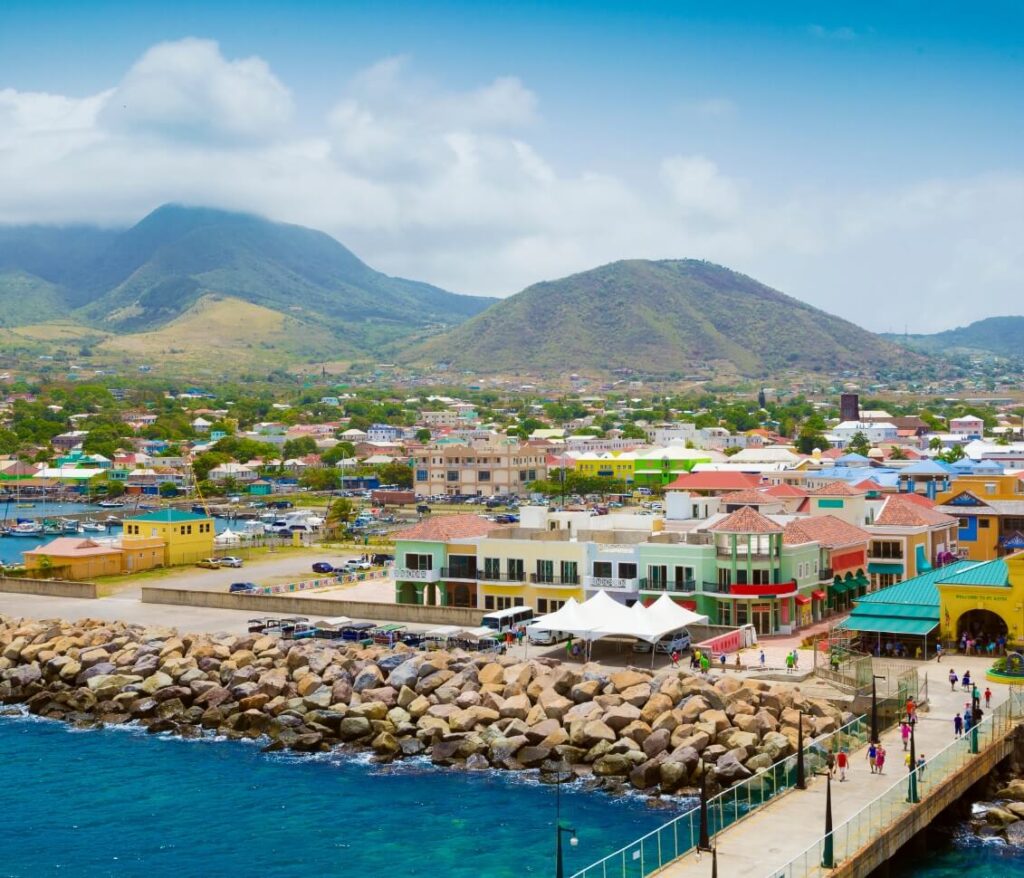Protect Your Assets with a Nevis Trust
The Federation of Saint Christopher and Nevis, or St. Kitts and Nevis, is a premier offshore jurisdiction for asset protection. A Nevis Trust offers extensive protection against a wide range of legal threats, making it an attractive option for safeguarding your wealth.
With a well-established legal framework and strong asset protection laws, Nevis stands out as one of the world’s leading destinations for offshore trusts.

What Is a Nevis Trust?
A Nevis Trust is an offshore asset protection trust created and administered in St. Kitts and Nevis. The island operates under the Nevis International
Exempt Trust Ordinance, which provides unparalleled protection from foreign creditors and legal challenges. Nevis law does not recognize foreign judgments, prohibit asset freezing orders, or allow fraudulent asset transfer claims after two years. This makes a Nevis Trust one of the most secure ways to protect assets globally.
Why Choose Nevis Trust For Asset Protection?
Nevis offers several benefits when it comes to asset protection through trusts, including:
- Legal Framework: Nevis has a strong legal system based on English common law, with clear laws safeguarding your assets.
- Creditor Protection: Nevis Trusts are designed to protect your wealth from creditors and lawsuits, even in cases of foreign legal claims.
- Privacy & Confidentiality: Nevis offers strict confidentiality laws, ensuring that your assets and personal information remain private.
- Tax Benefits: Nevis has a favorable tax environment, with no income, estate, or inheritance taxes.
- International Recognition: Nevis Trusts are used worldwide for advanced asset protection.

Why Should You Consider a Nevis Trust?
A Nevis Trust has many benefits — here are some of them:- Asset protection: Nevis Trusts can hold and protect a wide array of investments and assets, including cash, real estate, cryptocurrency, limited liability companies (LLCs), offshore bank accounts, stock market investments, and other assets.
- Litigation prevention: One of the main advantages of a Nevis Trust is that it can prevent lawsuits before they even start. Plaintiffs would think twice before initiating litigation because of the costs and legal hurdles involved and might consider a settlement instead.
- Estate planning: You can use certain Nevis Trusts and other asset protection tools for estate planning purposes as well as asset protection. A properly set up trust can safeguard your estate and beneficiaries from creditors and streamline the succession process.
- Ease of use: You do not need to visit St. Kitts and Nevis to set up a trust on the islands. A U.S.-based attorney from our office at Blake Harris Law can help you form the trust with the help of a Nevis-based representative. The trust formation process itself is relatively quick and streamlined.

The Benefits of a Nevis Trust
A Nevis Trust has many benefits — here are some of them:-
- Asset Protection: Nevis Trusts can hold a variety of assets, including cash, real estate, cryptocurrency, LLCs, offshore bank accounts, and stock market investments.
Read More- Litigation prevention: Nevis Trusts often deter potential lawsuits due to the high cost and legal hurdles plaintiffs would face in trying to access trust assets.
- Estate planning: Nevis Trusts can be used as an estate planning tool, ensuring a smooth and protected transfer of wealth to your beneficiaries while shielding it from creditors.

Why work with Blake?
Attorney Blake Harris is passionate about helping you protect your assets from lawsuits. Before founding Blake Harris Law, Blake worked for one of the largest wealth management firms in the United States, where he helped high/ultra-high-net-worth clients protect their personal assets. Since then, Blake has gained extensive experience in all areas of asset protection and has assisted clients worldwide with asset protection planning.
Over the years, Blake has built and continues to nurture a vast network of legal and finance professionals in countries such as Belize, the Cayman Islands, the Cook Islands, Liechtenstein, New Zealand, Panama, St. Kitts and Nevis, and Switzerland. Blake’s knowledge, experience, and connections enable him to handle even the most complex and sensitive asset protection issues other attorneys find challenging or are unwilling to represent. Whether you are looking to set up an offshore trust, establish a foreign limited liability company, or protect your digital assets, Blake will work hard to protect your wealth.
What Can a Nevis Trust Protect?
A Nevis Trust can protect a variety of assets, including:
- Offshore Bank Accounts: Nevis Trusts can hold accounts from Nevis banks as well as those in other offshore jurisdictions like the Cayman Islands, Luxembourg, or Switzerland.
- Real Estate: Nevis Trusts can own property, including land and buildings, both on the island and abroad.
- Investments: Stocks, bonds, and other financial investments can be held in a Nevis Trust.
- LLCs: Nevis Trusts can own and protect your limited liability
companies (LLCs), safeguarding the business assets as well.
Nevis Trust vs. Other Trust Options
| Feature | Nevis Trust | Domestic Trust (U.S.) |
|---|---|---|
| Jurisdiction | Offshore (St. Kitts and Nevis) | Onshore (U.S. state-based) |
| Protection from Foreign Creditors | High: Nevis does not recognize foreign judgments | Low: U.S. courts can enforce foreign judgments |
| Asset Freezing Orders | Not allowed under Nevis law | Possible in U.S. courts |
| Fraudulent Transfer Claims | Statute of limitations of 2 years | Can be challenged indefinitely |
| Confidentiality | Strict privacy protections | Limited privacy protection |
| Tax Benefits | No income, estate, or inheritance taxes | Subject to U.S. taxation |
What Does It Cost to Set Up a Nevis Trust?
The full initial cost of setting up a Nevis Trust is $30,000, with no hidden hourly billing or additional fees. This includes:
- Legal drafting and registration of the trust
- Trustee onboarding and first-year trustee fees
- IRS and FinCEN reporting
- Offshore bank or brokerage account setup
- Ongoing support without additional hourly charges
- Annual Fee: $6,000, covering trustee maintenance, legal compliance, and year-round advice from our team.
How Do Nevis Trusts Work for Asset Protection?
A Nevis Trust works by legally transferring ownership of your assets into the trust. The trust is managed by a local Nevis trustee, with you (the settlor) as the original owner and potentially a beneficiary. Nevis law provides that creditors cannot easily access trust assets, as the legal barriers for initiating litigation against the trust are high. A plaintiff must file a $100,000 bond just to bring a case against a Nevis Trust, and even then, they face substantial legal hurdles.
Key Legal Safeguards of Nevis Trusts
- Non-recognition of Foreign Judgments: Foreign court orders,
including those from the U.S., cannot be enforced in Nevis. - No Asset Freezing Orders: Nevis does not allow injunctions or
asset freezing orders against trust assets. - High Standard of Proof: Nevis uses the highest standard of proof
(“beyond a reasonable doubt”) in civil cases, which makes litigation
more challenging for creditors. - Statute of Limitations: Nevis imposes a two-year statute of
limitations on fraudulent conveyance claims, after which assets
transferred to the trust cannot be challenged.
The Nevis Trust Setup Process
Setting up a Nevis Trust is straightforward and does not require you to be physically present on the island. Here’s a step-by-step guide:
- Choose a Trustee: A licensed, professional trustee based in Nevis will manage the trust. You can work with a U.S.-based attorney to find the right trustee.
- Define the Beneficiaries: These are the individuals or entities that will benefit from the trust.
- Transfer Assets: After the trust is established, assets such as bank accounts, LLCs, real estate, or investments are transferred into the trust.
- Due Diligence: The trustee will require certain documents to verify your identity and legal standing, such as a passport, proof of residence, and bank statements.
Timeline: The process typically takes a few weeks to establish, but it can be expedited
depending on your specific needs.
Contact Blake Harris Law Today
Attorney Blake Harris is passionate about helping you protect your assets from lawsuits. Before founding Blake Harris Law, Blake work for one of the largest wealth management firms in the United States, where he helped high/ultra-high-net-worth clients protect their personal assets. Since then, Blake has gained extensive experience in all areas of asset protection and has assisted clients worldwide with asset protection planning. Over the years, Blake has built and continues to nurture a vast network of legal and finance professionals in countries such as Belize, the Cayman Islands, the Cook Islands, Liechtenstein, New Zealand, Panama, St. Kitts and Nevis, and Switzerland. Blake’s knowledge, experience, and connections enable him to handle even the most complex and sensitive asset protection issues other attorneys find challenging or are unwilling to represent. Whether you are looking to set up an offshore trust, establish a foreign limited liability company, or protect your digital assets, Blake will work hard to protect your wealth.
Let’s Have a Talk
Have questions? Fill out the form below to talk to an experienced asset protection attorney.
"*" indicates required fields
Frequently Asked Questions (FAQs) About
Nevis Trusts
A Nevis Trust is an offshore asset protection trust that you can establish in the Federation of St. Kitts and Nevis. It helps protect your assets from creditors, lawsuits, and other legal threats, providing high levels of privacy and security.
Nevis Trusts are renowned for their strong legal protections, including strict confidentiality provisions, the non-recognition of foreign judgments, and asset protection that makes it difficult for creditors to access your assets. The jurisdiction has favorable laws that safeguard assets better than domestic trusts in many cases.
A Nevis Trust helps separate your assets from potential legal claims by placing them under the control of a local trustee in Nevis. Nevis law makes it challenging for creditors to access these assets, with provisions like a high court bond requirement to file lawsuits and a short statute of limitations for fraudulent conveyance claims.
Yes, Nevis Trusts are entirely legal for U.S. citizens and residents. They are established under Nevis laws and offer offshore asset protection that U.S. domestic trusts cannot provide, such as protection from U.S. court judgments.
Yes, you can transfer a wide range of assets into a Nevis Trust, including real estate, LLCs, bank accounts, investments, and more. This is a key component of asset protection, helping shield your wealth from potential lawsuits and creditors.
Nevis Trusts provide significantly stronger protections than domestic U.S. asset protection trusts. Unlike domestic trusts, Nevis Trusts are not subject to U.S. court orders, including judgments and asset freezes. Nevis also does not recognize foreign judgments, making it a more secure option for protecting assets.
The process of setting up a Nevis Trust can take as little as a few weeks, depending on the complexity of the assets and the paperwork required. The process typically involves selecting a trustee, preparing trust documents, and transferring assets.
Yes, Nevis Trusts are not subject to U.S. court judgments. Nevis does not recognize foreign judgments, which means that a U.S. court cannot seize assets placed in a Nevis Trust, providing a much higher level of protection compared to domestic trusts.
The cost of setting up a Nevis Trust is $30,000, with no hidden hourly billing or additional fees.
While both a Nevis Trust and a Nevis LLC provide asset protection, they function differently. A trust is a legal entity that holds assets for the benefit of designated beneficiaries, while an LLC is a business entity that limits liability for business owners. Both options are valuable for protecting assets, but the choice depends on your specific goals and asset protection needs.
Nevis has strong privacy laws protecting the confidentiality of assets held in a trust. The jurisdiction requires that trustees maintain strict confidentiality and does not disclose trust details without the consent of the parties involved, ensuring your assets remain protected and private.